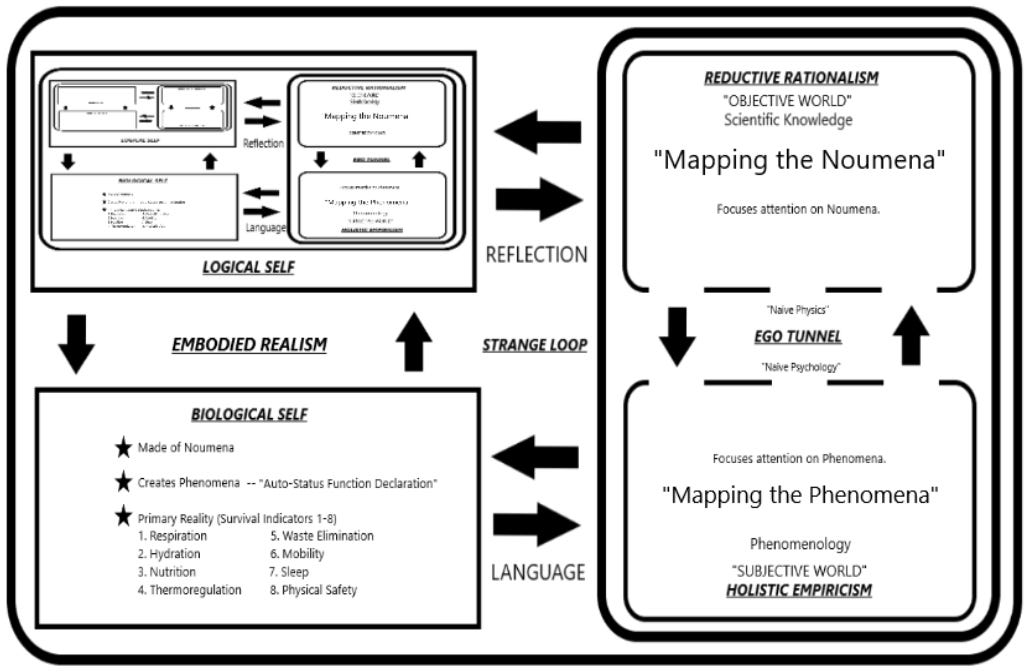In this last Summary So Far post I would like to strip everything away, and get down to the core elements of what can be said about what is universally applicable to human experience, regardless of perspective. The purpose for doing this will be to expose what can, and cannot, be said about the Philosophy of Evolution.
Let’s begin by reexamining George Lakoff and Mark Johnson’s book, Philosophy in the Flesh. In this book they say:
“Reason is not disembodied, as the tradition has largely held, but arises from the nature of our brains, bodies, and bodily experience. This is not just the innocuous and obvious claim that we need a body to reason; rather, it is the striking claim that the very structure of reason itself comes from the details of our embodiment. The same neural and cognitive mechanisms that allow us to perceive and move around also create our conceptual systems and modes of reason. Thus, to understand reason we must understand the details of our visual systems, our motor system, and the general mechanisms of neural binding. In summary, reason is not, in any way, a transcendental feature of the universe or of disembodied mind. Instead, it is shaped crucially by the peculiarities of our human bodies, by the remarkable details of the neural structure of our brains, and by the specifics of our everyday functioning in the world.
Reason is evolutionary, in that abstract reason builds on and makes use of forms of perceptual and motor inference present in “lower” animals. The result is a Darwinism of reason, a rational Darwinism: Reason, even in its most abstract form, makes use of, rather than transcends, our animal nature. The discovery that reason is evolutionary utterly changes our relation to other animals and changes our conception of human beings as uniquely rational. Reason is thus not an essence that separates us from other animals; rather, it places us on a continuum with them.
Reason is not “universal” in the transcendent sense; that is, it is not part of the structure of the universe. It is universal, however, in that it is a capacity shared universally by all human beings. What allows it to be shared are the commonalities that exist in the way our minds are embodied.
Reason is not completely conscious, but mostly unconscious.
Reason is not purely literal, but largely metaphorical and imaginative.
Reason is not dispassionate, but emotionally engaged.” (Page 4)
If we take this to be Justified - Trusted- Knowledge, then Reductive Rationalism (Reason) is constructed from, and reliant upon, Holistic Empiricism (Affect). So, Holistic Empiricism (Affect) precedes Reductive Rationalism (Reason). And as we will see in the next series of posts - What Does the Brain/Body Do? - Affect is simply the bodies way of monitoring, and making predictions to maintain, the body’s homeostasis. Pragmatic prediction making is the Brain/Body’s way of continuing survival in an uncertain environment. We Reason to survive. However, the key point about Reductive Rationalism is that it is just as much environmentally and socially constructed as Holistic Empiricism is. The border between Self, Others, and Environment is ephemeral.
Now, consciousness comes and goes, but the body remains. Additionally, it can feel as though our consciousness is separated from our bodies.
When we are satiated with food and drink; when our environments are safe; when our bodies are healthy, and free from disease, then Dualism invariably sets in. It is no coincidence that the proliferation of bizarre beliefs which result from Dualism coincides with levels of affluence in a society. With either too much Certainty, or too little Certainty, in yourself, in others, and in your environment, then often Logic deteriorates and pure Affect reasserts itself (Hedonism). This entire process is all summed up in the concept of the Strange Loop.
Humans have the distinct ability to create highly detailed maps of their surroundings. This map making ability turned inwards - this is what we call Consciousness and it isn’t mysterious. However, the problem for the Reductive Rationalist and the Holistic Empiricist alike is that the Strange Loop has to have an origin somewhere, and that somewhere is in the Noumena - the ineffable Noumena. If you follow the Logic to its logical end, you find yourself in a position where you have to say that you are using Logic to explain the origin of Logic itself - it’s the Münchhausen Trilemma all over again. It’s the Liar’s Paradox. It’s Gödel's Incompleteness Theorems. Human Logic creates paradox. In this scenario, only the Skeptical Perspective Logically prevails - Taking the Skeptical Perspective, which I call ‘1% Arguments’, will always win in a Logical argument. This explains why Science can never claim Certainty about anything, but can still prove things wrong in an Empirical way. This also explains why meanings and concepts are fuzzy and that sometimes you can’t definitively describe anything with precision, but you can also “know it when you see it”. This is where the problems of Philosophy begin and end.
However, in the Philosophy of Evolution, Logic is not the beginning point. Logic is the outcome of Evolution. Having a body that wants to survive is the beginning - this is the empirical, Justified - Trusted - Knowledge. This is the Foundational beginning. There is nothing required from a Reductive Rationalist point of view to hold this belief, because it isn’t a belief. Even babies do it; it is a Non-Conscious process. This Non-Conscious process is Evolutionary Teleonomy. [In the bonus post to follow, I will explain why Evolutionary Teleonomy is so important.]
In the next series of posts, I will start from the Noumenon and give my best interpretation for what the Phenomenon is trying to tell us. This will be an explanation for What Does the Brain/Body Do? So, let us see if the diagram below, which is a mental model of the ‘Strange Loop Block,’ has any Pragmatic value by revisiting Professor Hofstadter. Then we will move on to Professor Metzinger and his concept of the Ego Tunnel.
In closing, I would like to make the following observation:
Evolution is about selection pressures placed on variation among entities; or, simply put, selection among variation. In this case, the Philosophy of Evolution, as a worldview, is the entity under consideration. There must be a variation of worldviews on which the selection process acts.
The Philosophy of Evolution is one among many alternative worldviews and the Philosophy of Evolution is a self-referential meta-philosophy that claims that Evolution is Everything. Since only the most useful worldviews will continue to persist - according to its own rules - it may eventually go extinct. But by going extinct, it proves its own validity. [Is that a meta-Strange Loop?]
Artist: M. C. Escher (Year1960) Type: Lithograph




